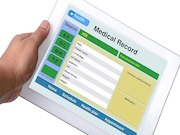Tag: Medical Records
Scribes Improve Dermatologist Satisfaction, Cut Chart Burden
79 percent of dermatologists report willingness to increase patient volume with scribe support
Design Thinking Enables Med Students to Solve Challenges
Partnership with design students focuses on innovative solutions to health system issues
Sharing Passwords Is Widespread Among Medical Staff
Almost three-fourths of survey respondents report having used a colleague's password to access EMRs
Quality Issues for Both Paper-, Electronic-Based Health Records
Study affirms poor quality of nursing documentation, as well as lack of knowledge and skills
EHRs Take Up Substantial Time for Ophthalmologists
27 percent of an average-length patient encounter is spent on electronic health record use
Working With a Scribe Improves Physician Satisfaction
When scribes draft documents, physicians happier with chart quality and accuracy, time with patients
System Collects Data on Functional Septorhinoplasty
Outcomes data have been collected for more than 1,000 patients since the process was implemented
Doctors Spend Almost Six Hours Per Day on EHR Tasks
Clerical and administrative tasks including order entry, billing account for almost half of hours
Greater Engagement for Patients Who Read Visit Notes
Patients value confirming and remembering next steps, quicker access and results, sharing information
Inpatient Progress Note Content Often Cut and Pasted
About half of the content is pasted from elsewhere by medical students, residents, hospitalists














